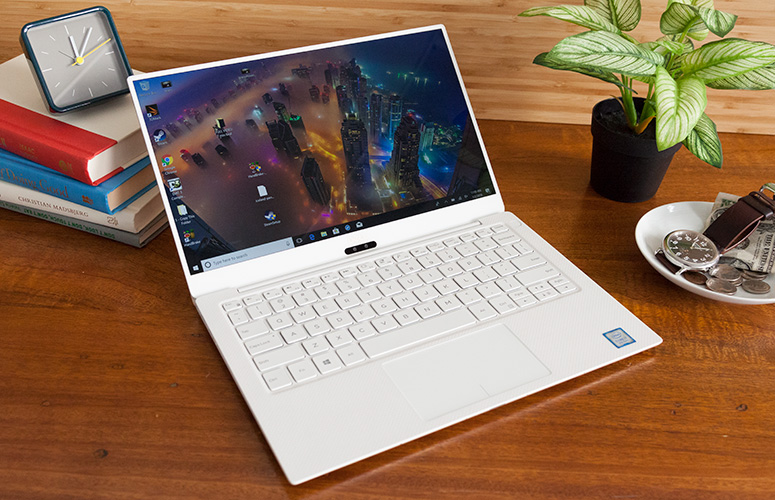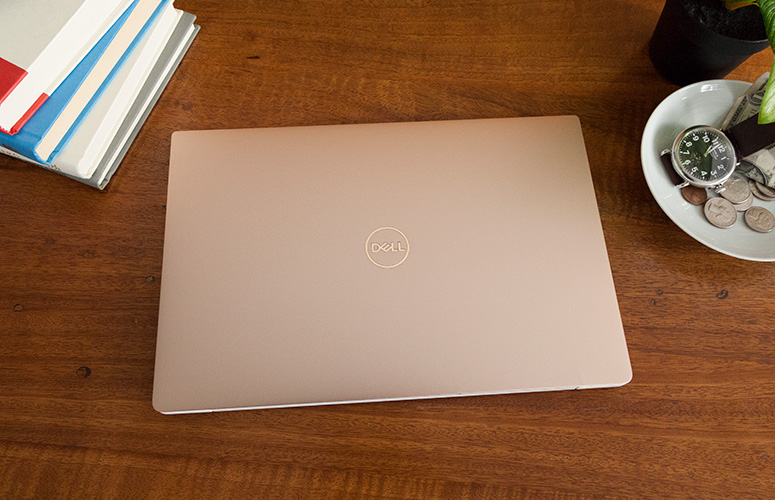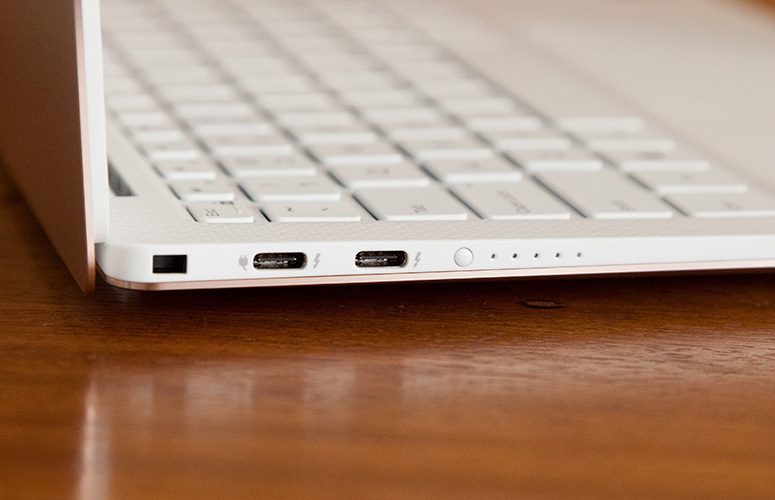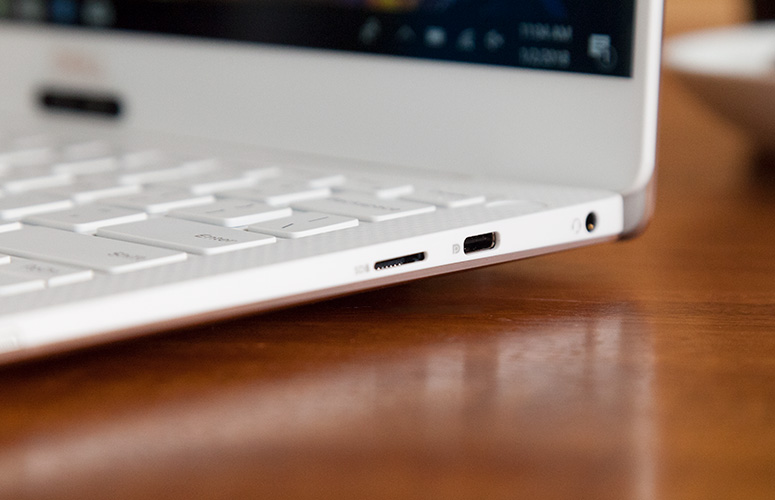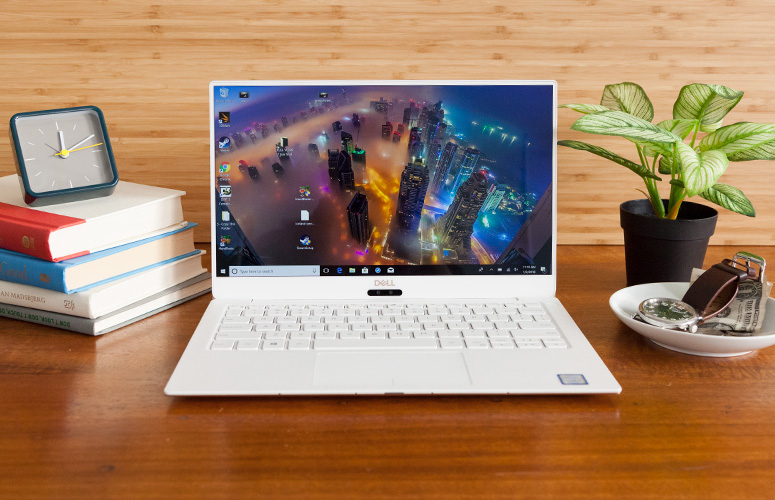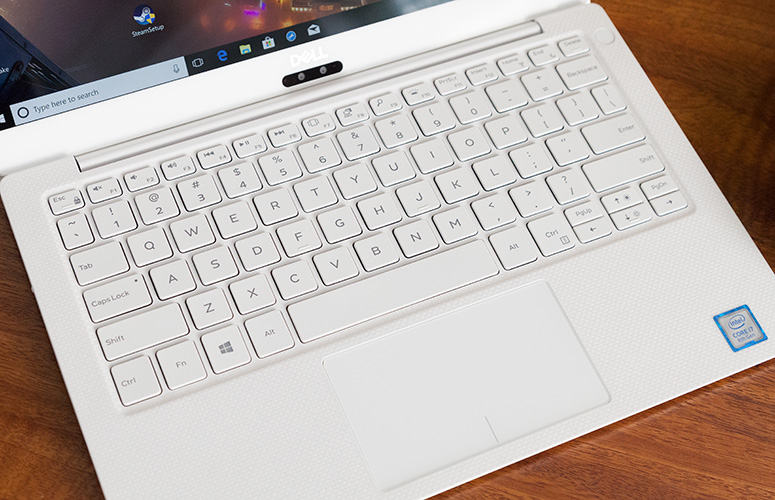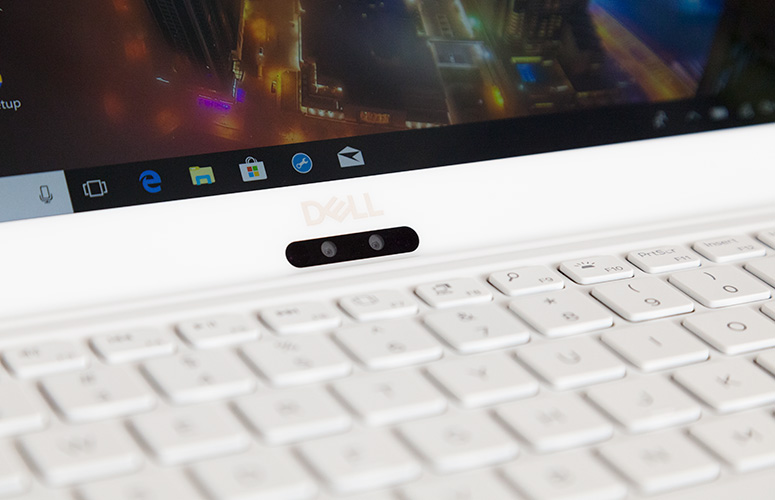Laptop Mag Verdict
The Dell XPS 13 9370 offers strong performance, long battery life and a stunning screen in a chassis that's slimmer and more attractive than ever.
Pros
- +
Attractive design; Vibrant screen; Strong performance; Good battery life overall; Runs cool
Cons
- -
No USB Type-A Ports; Improved webcam still looks up your nose
Why you can trust Laptop Mag
Update Jan. 8: Check out our review of the 2019 Dell XPS 13, which ditches that awkward 'nosecam.'
Dell's XPS 13 has remained our favorite consumer laptop for the past few years, thanks to its beautiful nearly borderless display, light weight and sleek aesthetic. Now, after multiple generations of sticking with the same chassis, Dell's premium flagship has a new design with slimmer dimensions and a beautiful white-and-gold color scheme. In other improvements, the XPS 13 9370 ($849 to start, $1,249 / $2,499 as tested) also offers an optional 4K display, a better webcam, support for eGPUs and a cooling system that promises stronger sustained performance.
However, to make its laptop thinner, Dell switched to a smaller battery and got rid of USB Type-A ports. As a result, some users will prefer the older, XPS 13 9360, which is still for sale and is powered by the same Intel 8th Gen Core CPUs. But if you want the best combination of design, portability and power, the XPS 13 9370 is the ultraportable to beat.
Dell XPS 13 9370 pricing and configuration
Dell offers several configurations of the XPS 13 9370, with prices ranging from $849 to well over $2,000. The $849 base model has a 1080p non-touch screen, a Core i3-8130 CPU, 4GB of RAM and a 128GB SSD; the white model costs $50 more.
We recommend the $1,099 model, which includes a Core i5 processor, 8GB of RAM and a 256GB SSD. The tricked-out, $1,869 model has a 4K touch screen, a Core i7-8550U CPU, 16GB of RAM and a 256GB SSD. A 512GB SSD costs $150 more and a 1TB SSD runs $750.
If battery life is your highest priority, get a model with the 1080p non-touch screen, but the vibrant colors on the 4K panel make it an even more attractive choice.
Dell XPS 13 9370 design
If you put the last few generations of the XPS 13 in a lineup, you would not be able to tell them apart, unless you looked at the CPU sticker on the deck. However, the XPS 13 9370 stands out with its new, optional gold-and-white color scheme, along with a slightly slimmer and lighter profile. Dell also sells the 9370 in the XPS 13's traditional silver-and-black aesthetic.
Sign up to receive The Snapshot, a free special dispatch from Laptop Mag, in your inbox.
Though it costs a little bit more ($50 extra on the base model), you'll definitely want to get the white color, because it's just plain stunning. The lid and bottom are made from gold-colored aluminum, while the white sides and deck are fashioned from woven crystalline silica fiber. The deck's weave-like texture adds an air of sophistication and felt good against our wrists, though not quite as comfy as the soft-touch carbon-fiber deck on older XPS 13s and on the silver model.
No matter which color you choose, the XPS 13 is a little bit slimmer and lighter than its predecessor. The XPS 13 9370 weighs just 2.65 pounds and is a mere 0.46 inches thick at its thickest point (0.3 inches at its thinnest). The last generation XPS 13 9360 weighs 0.13 pounds more and is 0.14 inches thicker. HP's Spectre 13 is even svelter, weighing 2.4 pounds and measuring 0.41 inches thick. The Lenovo ThinkPad X1 Carbon tips the scales at 2.49 pounds, but is 0.6 inches.
Dell XPS 13 9370 ports
Unfortunately, when slimming the XPS 13 down to 0.46 inches, Dell had to ditch the standard, USB Type-A ports and full-size SD card reader that appeared on all the previous generations. On the left side of the XPS 13 9370, you'll find two Thunderbolt 3 ports, which can charge the laptop or connect to high-speed peripherals. There's also a Noble lock slot and a battery gauge, which shows the charge level on a series of five white lights.
On the right, you'll find a 3.5mm audio jack, a microSD card slot and a USB Type-C port, which can output DisplayPort video. Both the Dell XPS 13 9360 and ThinkPad X1 Carbon have standard USB ports in addition to the Thunderbolt 3, while the HP Spectre 13 also lacks USB Type-A connectors.
In a major improvement over the XPS 13 9360, the 9370's Thunderbolt 3 ports support four-lane PCI connections, so you can use the laptop with an eGPU for serious gaming.
In a major improvement over the XPS 13 9360, the 9370's Thunderbolt 3 ports support four-lane PCI connections so you can use the laptop with an eGPU (external graphics card) that enables serious gaming. Prior models had only two lanes of PCI connected to their Thunderbolt 3 ports, so they couldn't work properly with external graphics. We tested the XPS 13 9370 with an Aorus Gaming Box 1070, and it worked.
Dell XPS 13 9370 display
The XPS 13 9370's 13.3-inch, InfinityEdge display has bezels that are 23 percent thinner than the almost nonexistent borders on the XPS 7360. Because there's virtually no frame around the top and sides of the screen, images just seem to pop more.
We tested the Dell XPS 13 9370 with both a 3840 x 2160 (4K, Ultra HD) touch screen and a 1920 x 1080 non-touch screen. Both models offered impressive brightness, color quality and sharpness, though the 4K screen was noticeably better. When I watched the 4K movie Tears of Steel, the neon pink and green lights impressed on both displays, but were richer on the Ultra HD panel. Fine details, such as the wires on a robot's body and the wrinkles in a character's jacket, stood out on both panels, and colors stayed true, even at 90 degrees to the left or right.
According to our light meter, the XPS 13 9370 with 1080p screen achieved an impressive mark of 372 nits, while the model with the 4K panel blew us away with 415 nits. Both numbers are significantly higher than the ultraportable laptop category average (290 nits), the X1 Carbon (275 nits) and the HP Spectre 13 (247 nits). The XPS 13 9360 with 1080p screen scored a similar 368 nits.
The 1080p screen on the XPS 13 9370 reproduced an impressive 117 percent of the sRGB color gamut, but the 4K panel was much more vibrant, hitting a full 130 percent. Both numbers compare favorably to the category average (105 percent) and the ThinkPad X1 Carbon (104 percent with 1080p screen). But the 1080p panel is only 5 to 6 percentage points ahead of the XPS 13 7360 (112 percent) and the Spectre 13 (111 percent).
Dell XPS 13 9370 audio
The XPS 13 9370's side-mounted speakers deliver audio that's loud, but rough around the edges. When I played AC/DC's "Back in Black," the music was boisterous enough to more than fill our lab, but the guitar and drums were a little harsh and tinny. The pre-loaded Waves MaxxAudio software allows you to fine-tune the equalizer. Disabling MaxxAudio, which is on by default, made the music sound hollow and distant.
Dell XPS 13 9370 keyboard and touchpad
The XPS 13 9370's keyboard offers a solid typing experience, even though the keys are a little on the shallow side. Perhaps because the laptop is so thin, the keys have 1.2 millimeters of travel (1.5 to 2mm is common on mainstream laptops), but they make up for it somewhat by providing a good 72 grams of required actuation force. On the Tenfastfingers.com typing test, I reached a modest rate of 94 words per minute with a 4 percent error rate, which is on the low end of my normal range.
Whether I was double-clicking on icons or highlighting small pieces of text in an article, the 4.1 x 2.4-inch, buttonless touchpad provided extremely accurate navigation, without any sticking or jumping. The left and right click areas provided just the right amount of tactile feedback. The pad also responded immediately and accurately to multitouch gestures such as pinch-to-zoom and three-finger swipe.
Dell XPS 13 9370 performance
For this review, we tested two different configurations of the XPS 13 9370. The high-end model sported a Core i7-8550U CPU, 16GB of RAM, a 1TB SSD and a 4K touch screen, while the mainstream model had a Core i5-8250U processor, 8GB of RAM, a 256GB SSD and a 1080p non-touch screen. From surfing the web to light gaming and writing portions of this review, both versions of the XPS 13 9370 handled everything we threw at them, without a hiccup.
Because it uses a new thermal setup with dual fans, dual heat pipes and special thermal insulation, the XPS 13 9370 is able to prevent its processor from throttling as aggressively as many other laptops.
Thanks to Dell's new cooling system, these laptops were also capable of delivering better sustained performance on long tasks, such as compressing a 4K video or running the same benchmark 10 times in a row.
As they heat up during intense tasks, most laptops slow their CPUs down to cool them down. Because it uses a new thermal setup with dual fans, dual heat pipes and special thermal insulation, the XPS 13 9370 is able to prevent its processor from throttling as aggressively as many other laptops.
We saw evidence of the performance improvement during our video compression test where we use Handbrake to transcode a 4K video to 1080p. The Core i7-powered XPS 13 9370 took just 16 minutes to complete this task. he XPS 13 9360, on the other hand, which had the same exact Core i7-8550U CPU, took 19 minutes and 35 seconds.
We also ran the Cinebench R15 benchmark, which measures processing power by drawing a 3D image 10 times in a row on a few different laptops. The XPS 13 9370 with the Core i7 processor got a score of 679 on the first run (higher is better), which dropped to 635 on run No. 10, a decline of 6.4 percent. Its Core i5-powered sibling, however, went from 666 to 633, a drop of 4.9 percent. When we tried the same task on a Microsoft Surface Book 2 (13-inch) with Core i7-8550U, it suffered a 26 percent decline from first to last run. An HP Spectre x360 with the same Core i7 processor remained perfectly stable, getting a much lower mark of 456 on both the first and final runs.
Using the Dell Power Manager app, you can configure the laptop's thermal management to offer "Ultra Performance," with warmer temperatures. We ran Cinebench 15 10 times in this mode, and the scores ranged from 707 on the first run to 655 on the 10th run. Though, those are higher numbers, we also experienced higher temperatures, with the function row hitting a balmy 115 degrees by the end of the last run. We recommend sticking with the default, "Optimized" mode, which gives you the best balance between performance and skin temperature.
When we ran Geekbench 4, a synthetic test that measures processing performance, the Core Core i5-8250U-powered XPS 13 9370 scored 13,254, while the Core i7-8550U-enabled version registered 14,180. The last-gen Dell XPS 13 9360 with the same Core i7-8550U CPU scored a very similar mark of 14,158. HP's Spectre 13, also with Core i7-8550U inside, scored a lower mark of 13,090. The ThinkPad X1 Carbon and its last-gen Core i7-7600U processor, hit only 8,571.
The XPS 13 9370 with Core i7 took just 1 minute and 6 seconds to match 50,000 names with their addresses in Microsoft Excel. The Core i5 model finished in 1 minute and 15 seconds, while the XPS 13 9360 fell in between the two with 1:08.
The 1TB PCIe SSD in the Core i7-powered XPS 13 9370 took just 13 seconds to copy 4.97GB of files, a rate of 399.4 MBps, while the 256GB unit in the Core i5 model performed the same task at a rate of 339.2 MBps. Both numbers are much better than the category average (232 MBps) and the X1 Carbon (242 MBps). The XPS 13 9360 with 256GB SSD was even faster, achieving a rate of 508 MBps. The HP Spectre 13 (339.3 MBps) basically tied the Core i5-powered XPS 13 9370.
Dell XPS 13 9370 graphics
WIth its integrated Intel UHD 620 GPU, the XPS 13 9370 is good enough for doing light video editing or playing some games at low settings. Its Core i7- and Core i5-powered models scored 85,616 and 77,584, respectively, on 3DMark Ice Storm Unlimited, a synthetic graphics test. Both models were far ahead of the category average (62,573), the HP Spectre 13 (75,114) and the X1 Carbon (68,082). The XPS 13 9360 fell in between the two with a mark of 81,837.
No matter which Dell XPS 13 9370 configuration you choose, you'll get above-average battery life, but a model with the 1080p non-touch screen lasts several hours longer.
When playing Dirt 3, the XPS 13 with Core i7 returned a frame rate of 66.9 fps, whereas the Core i5 model got a still-strong 56.7 fps. The XPS 13 9360 (56 fps) and the HP Spectre 13 (57 fps) got similar rates, while the X1 Carbon (28 fps) and category average (42 fps) were way behind.
Dell XPS 13 9370 battery life
No matter which Dell XPS 13 9370 configuration you choose, you'll get above-average battery life, but a model with the 1080p non-touch screen lasts several hours longer. The XPS 13 9370 with 1080p non-touch screen lasted 12 hours and 37 minutes on the Laptop Battery Test, which involves continuous surfing over Wi-Fi. The model with the 4K display endured for 8 hours and 53 minutes. Those numbers compare favorably to the ultraportable category average (8:16) and the HP Spectre 13's time of 6:16.
However, Dell's slightly older XPS 9360 with 1080p screen lasted a much-longer 16 hours and 5 minutes on our test. That's because, in making its laptop thinner and lighter, Dell switched from a 60 watt-hour battery on the 9360 to a 52 watt-hour unit on the 9370.
Dell XPS 13 9370 heat
Both XPS 13 9370 configurations we tried stayed pleasantly cool throughout our testing. After streaming a video for 15 minutes, the touchpad, keyboard and bottom of the Core i7-powered model hit 82, 86.5 and 88 degrees Fahrenheit, all well below our 95-degree comfort threshold. The Core i5 model got similar temperatures of 80, 85.5 and 88 degrees.
Dell's Power Manager app allows you to configure the laptop's thermal management for maximum performance, lowest temperature or least noise. We used the default, Optimized setting during most of our testing, and the laptop always felt cool to the touch. However, when we switched to the "Ultra Performance" mode we got slightly higher scores, but the top of the keyboard hit 115 degrees.
Dell XPS 13 9370 webcam
With the XPS 13 9370, Dell has moved the webcam from the lower left corner of the bezel to the center bottom.
Yes, it's still a "nose cam" that looks up at you, but because the lens is centered, it gets much better angles. When I shot a selfie, I was able to get my head in the center top of the frame, with the camera looking up at me, by lowering and raising the lid.
Image quality was on a par with other premium laptops; colors like the blue and gray in my shirt were true, and there was only a limited amount of visual noise in the background.
Dell XPS 13 9370 software and warranty
Dell preloads the XPS 13 9370 with a few useful utilities and some bloatware. Dell Power Manager lets you tweak the system settings for maximum performance (with more heat and noise), coolest skin temperature, quietest fan noise or a balance among the three. Dell Help & Support offers tutorials and warrant information. Dell SupportAssist checks system health, shows configuration information and helps you download new drivers. Dell remote Desktop lets you remote-control the laptop from another device.
The system also comes with its fair share of bloat. Dell packs on a trial of McAfee LiveSafe and a Dropbox promotion, which gives new users 20GB of free space for a year. Microsoft packs on its standard set of Windows 10 pre-loads, including Minecraft, March of Empires, Bubble Witch 3 Saga, Autodesk Sketchbook and a link to purchase Drawboard PDF.
Dell backs its laptop with a one-year, limited warranty on parts and labor. See how Dell fared on our Tech Support Showdown and Best and Worst Laptop Brand Ratings.
Bottom line
From its eye-popping 4K display to its speedy performance and beautiful design, there's a lot to love about the Dell XPS 13 9370. Although still not ideal, its centered webcam is a huge improvement over the left-aligned one on prior models. The 9370's ability to work with eGPUs also makes it a great choice for people who want to play demanding games.
Consumers who demand the longest possible endurance or who can't live without USB Type-A ports should consider the XPS 13 9360, which Dell will continue to sell for the foreseeable future. However, if you want the best combination of performance, portability and aesthetics, the XPS 13 9370 is made for you.
- Best 2-in-1s (Laptop/Tablet Hybrids)
- 10 Tablets with the Longest Battery Life
- Best Dell and Alienware Laptops
Dell XPS 13 9370 (2018) Specs
| Bluetooth | Bluetooth 4.1 |
| Brand | Dell |
| CPU | Intel Core i7-8550U |
| Company Website | http://www.dell.com |
| Display Size | 13.3 |
| Graphics Card | Intel UHD Graphics 620 |
| Hard Drive Size | 256GB SSD |
| Hard Drive Speed | n/a |
| Hard Drive Type | SSD |
| Highest Available Resolution | 3840 x 2160 |
| Native Resolution | 1920x1080 |
| Operating System | Windows 10 |
| Optical Drive | None |
| Optical Drive Speed | n/a |
| Ports (excluding USB) | Headphone, Thunderbolt 3, Noble Lock |
| RAM | 8GB |
| RAM Upgradable to | 16GB |
| Size | 11.98 x 7.88 x 0.46 inches |
| Touchpad Size | 4.1 x 2.3 inches |
| USB Ports | 2 |
| Video Memory | Shared |
| Warranty/Support | one-year |
| Weight | 2.65 pounds |
| Wi-Fi | 802.11a/b/g/n/ac |
| Wi-Fi Model | Killer 1535 Wireless AC 2x2 |

